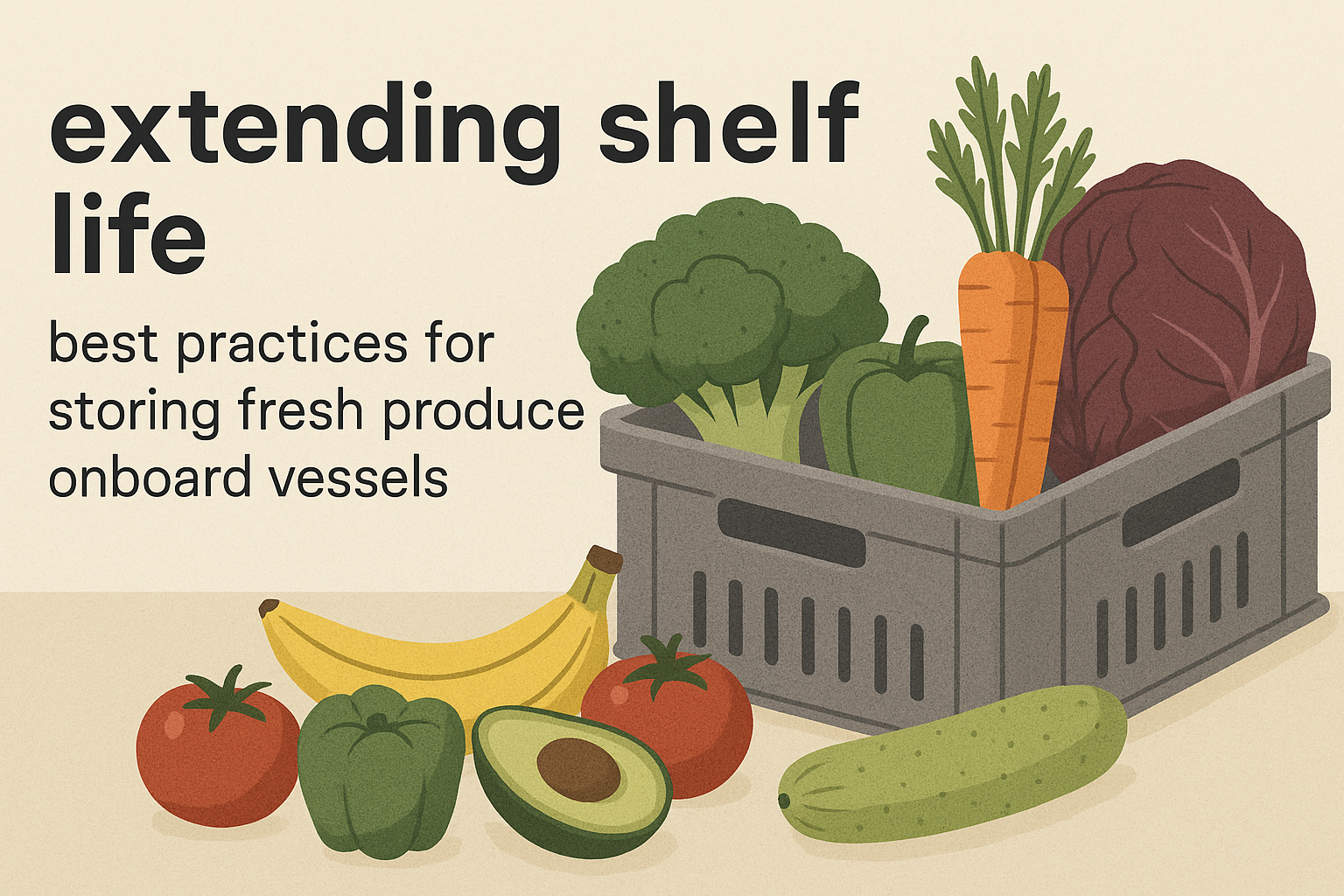For ship chandlery and supply services, the ability to deliver and advise on effective storage solutions is paramount. Companies like Astro Ship Supply, renowned for their provisions and food supply expertise in the Port of Houston and Gulf Coast, understand these challenges intimately. Their commitment goes beyond mere delivery; it extends to empowering vessel operators with the knowledge to maximize the longevity and nutritional value of their provisions.
The Core Principles of Produce Preservation at Sea
Effective produce storage onboard hinges on understanding and controlling key environmental factors. Neglecting these can lead to rapid spoilage, waste, and a significant impact on crew well-being. Here are the foundational principles:
Temperature Control: The Chilling Truth
Temperature is arguably the most critical factor in produce spoilage. Microorganisms responsible for decay thrive in warmer environments, while enzymes that cause ripening and degradation accelerate their activity. Different types of produce have varying optimal storage temperatures. Grouping produce by their temperature requirements is crucial to avoid chilling injury for some and accelerated ripening for others.
- Cool Storage (0°C to 4°C / 32°F to 40°F): This range is ideal for most fruits and vegetables, significantly slowing down respiration and microbial growth. Examples include leafy greens, broccoli, carrots, apples, and most berries.
- Chilled Storage (4°C to 10°C / 40°F to 50°F): Some produce, such as potatoes, onions, and citrus fruits, prefer slightly warmer cool conditions to prevent chilling injury, which can manifest as discoloration, pitting, or off-flavors.
- Room Temperature (13°C to 18°C / 55°F to 65°F): Certain fruits, particularly those that ripen after harvest (climacteric fruits), should be stored at room temperature until ripe, then moved to cooler storage if not consumed immediately. These include bananas, tomatoes, avocados, and peaches.
Case Study: The Banana Dilemma
Consider a vessel receiving a shipment of green bananas. Storing them in a cold room (0-4°C) would inhibit their ripening process, resulting in unpalatable, starchy fruits. Instead, keeping them at room temperature allows them to ripen naturally. Once ripe, they can be moved to a cooler, but not too cold, environment to extend their consumption window for a few days.
Humidity Management: The Moisture Balance
Humidity plays a dual role: too little leads to wilting and desiccation, while too much encourages mold and bacterial growth. Maintaining the right humidity level is a delicate balance.
- High Humidity (90-95%): Most leafy greens, broccoli, and root vegetables benefit from high humidity to prevent moisture loss. Storing them in perforated plastic bags or containers with some ventilation can help.
- Moderate Humidity (85-90%): Apples, pears, and citrus fruits do well in moderate humidity.
- Low Humidity (60-70%): Onions, garlic, and squash prefer drier conditions to prevent sprouting and rot.
Marine refrigeration units often come with humidity control features. Regular monitoring and adjustment are essential.
Air Circulation: The Breath of Freshness
Proper air circulation within storage areas prevents the buildup of ethylene gas and hot spots. Stacking produce directly against walls or in tightly packed boxes restricts airflow, leading to faster spoilage.
- Use slatted shelves or pallets to allow air to circulate around and under containers.
- Avoid overpacking refrigeration units; leave adequate space for air movement.
- Regularly check and clear any obstructions to vents.
Ethylene Sensitivity and Production: The Ripening Regulator
Ethylene is a natural plant hormone that accelerates ripening in climacteric fruits and can cause spoilage in ethylene-sensitive produce. Understanding which fruits produce ethylene and which are sensitive is vital for effective storage.
Ethylene Producers (Store Separately):
- Apples
- Bananas (ripe)
- Avocados
- Tomatoes
- Pears
- Peaches
- Melons
Ethylene Sensitive (Keep Away from Producers):
- Leafy Greens (lettuce, spinach, kale)
- Broccoli
- Cabbage
- Carrots
- Cucumbers
- Eggplant
- Potatoes
- Watermelon
Example Scenario: Mixed Produce Delivery
Imagine a new delivery arrives with a mix of apples, bananas, lettuce, and carrots. Storing all of them together in the same compartment would lead to the lettuce and carrots yellowing and spoiling quickly due to the ethylene emitted by the apples and ripening bananas. A better approach would be to store the apples and bananas separately from the leafy greens and root vegetables.
—
Practical Strategies for Onboard Produce Storage
Beyond the core principles, several practical strategies can be implemented to further extend the shelf life of fresh produce on vessels.
1. Proper Receiving and Inspection
The first line of defense against spoilage is thorough inspection upon delivery. Rejecting compromised produce at this stage prevents contamination and unnecessary waste.
- Check for Damage: Look for bruises, cuts, mold, or signs of pest infestation.
- Assess Ripeness: Ensure produce is at the appropriate stage of ripeness for your consumption timeline.
- Verify Temperature: For refrigerated deliveries, ensure the produce temperature is within acceptable limits upon arrival.
2. Cleaning and Preparation
While some produce benefits from washing before storage, others do not. Excess moisture can encourage bacterial growth.
- Wash as Needed: Leafy greens and berries can be washed just before consumption, not before storage. If washing is necessary for storage (e.g., to remove excess dirt), ensure they are thoroughly dried afterward.
- Trim as Necessary: Remove any damaged or excess parts that might accelerate spoilage (e.g., outer leaves of lettuce, green tops of carrots).
3. Optimized Packaging Solutions
The right packaging can create a microclimate that protects produce and extends its life.
- Perforated Bags: Ideal for leafy greens, broccoli, and other high-humidity loving vegetables. The perforations allow for some airflow while retaining moisture.
- Airtight Containers (with caution): Can be used for some pre-cut fruits and vegetables, but ensure they are thoroughly dry to prevent condensation buildup.
- Paper Towels: Wrapping produce like herbs in damp paper towels before placing them in a bag can help maintain freshness.
4. FIFO (First-In, First-Out) Inventory Management
This fundamental principle of inventory management is crucial for perishable goods. Always use older stock before newer stock to minimize waste.
- Clearly Label: Mark all produce with the delivery date and expected shelf life.
- Organize Systematically: Store older items at the front or top of shelves for easy access.
5. Regular Monitoring and Rotation
Consistent vigilance is key to identifying and addressing spoilage before it spreads.
- Daily Checks: Inspect produce regularly for signs of spoilage, mold, or wilting.
- Remove Spoiled Items: Immediately remove any spoiled items to prevent them from contaminating healthy produce.
- Rotate Stock: Move items nearing their expiration date to the front for immediate use.
6. Utilizing Desiccants and Ethylene Absorbers
For long voyages or particularly sensitive produce, these specialized products can offer an extra layer of protection.
- Ethylene Absorbers: Sachets or filters containing potassium permanganate can be placed in refrigeration units to absorb ethylene gas, thereby slowing ripening and spoilage.
- Desiccants: While less common for produce, some storage environments might benefit from desiccants to control overall humidity if not managed by the refrigeration unit itself.
—
Comparing Storage Methods: A Quick Reference
To summarize the diverse needs of various produce types, here’s a comparative overview of common storage methods:
| Produce Type | Optimal Temperature Range | Humidity Preference | Ethylene Sensitivity/Production | Best Storage Practice |
|---|---|---|---|---|
| Leafy Greens (Lettuce, Spinach, Kale) | 0-4°C (32-40°F) | High (90-95%) | Highly Sensitive | Wash just before use, store unwashed in perforated bags or crisper drawer. Keep away from ethylene producers. |
| Berries (Strawberries, Blueberries) | 0-4°C (32-40°F) | High (90-95%) | Sensitive | Store unwashed in original containers or shallow breathable containers. Wash just before consumption. |
| Apples & Pears | 0-4°C (32-40°F) | Moderate (85-90%) | High Ethylene Producer | Store in a cool, dark place or refrigerator, ideally in a separate drawer or away from sensitive produce. |
| Bananas | Room Temp. (13-18°C / 55-65°F) until ripe; then cool (not cold) | Moderate | High Ethylene Producer | Store at room temperature until desired ripeness. Once ripe, store in a cooler spot away from other produce. |
| Tomatoes | Room Temp. (13-18°C / 55-65°F) until ripe; then cool (not cold) | Moderate | Ethylene Producer | Store at room temperature stem-side down until ripe. Refrigerate ripe tomatoes only if they will be consumed quickly. |
| Potatoes & Onions | 4-10°C (40-50°F) | Low (60-70%) | Sensitive (potatoes to ethylene, onions to moisture) | Store in a cool, dark, well-ventilated area, separate from each other and other produce. Do not refrigerate. |
| Citrus Fruits (Oranges, Lemons) | 4-10°C (40-50°F) | Moderate | Low Ethylene Producer/Sensitive | Store at room temperature for short periods or in the refrigerator for extended freshness. |
| Broccoli & Cauliflower | 0-4°C (32-40°F) | High (90-95%) | Sensitive | Store unwashed in a perforated plastic bag in the refrigerator. |
—
The Astro Ship Supply Advantage: Beyond Just Delivery
For vessels operating in the Port of Houston and the wider Gulf Coast region, partnering with a reputable ship chandler like Astro Ship Supply offers a significant advantage. Beyond delivering premium quality provisions, they bring invaluable expertise in logistics, inventory management, and food safety compliance. Their comprehensive service includes:
- Quality Assurance: Adherence to strict quality controls throughout their Texas-based supply chain, ensuring every item meets maritime standards.
- Tailored Solutions: Understanding the unique needs of each vessel and providing customized provisioning that considers voyage length, crew size, and dietary requirements.
- Timely Deliveries: Ensuring provisions arrive exactly when and where they’re needed, minimizing storage time on shore and maximizing freshness onboard.
- Compliance Expertise: Navigating complex regulations, including HACCP food safety management and U.S. Customs and Border Protection requirements, to ensure seamless operations.
By leveraging the services of an experienced partner, vessel operators can optimize their provisioning process, reduce waste, and enhance crew satisfaction and health. This collaboration extends the benefits of best practices from the supply chain directly to the vessel’s galley.
—
Frequently Asked Questions (FAQ)
How can I prevent mold growth on fresh produce during long voyages?
Preventing mold growth primarily involves controlling humidity, ensuring proper air circulation, and avoiding washing produce before storage. Store produce in perforated bags or breathable containers to allow air flow and prevent moisture buildup. Regularly inspect and remove any spoiled items immediately, as mold can quickly spread.
Should all fruits and vegetables be refrigerated on a vessel?
No, not all fruits and vegetables should be refrigerated. Some, like bananas, tomatoes, avocados, and potatoes, prefer cooler room temperatures until they ripen. Refrigerating them too soon can cause chilling injury, affecting their flavor and texture. It’s crucial to understand the optimal storage temperature for each type of produce to maximize its shelf life and quality.
What is ethylene gas, and why is it important for produce storage on ships?
Ethylene gas is a natural plant hormone produced by certain fruits (ethylene producers) that accelerates the ripening process in themselves and in other ethylene-sensitive produce. On ships, it’s vital to store ethylene producers (like apples and ripe bananas) separately from ethylene-sensitive produce (like leafy greens and broccoli) to prevent premature spoilage and maintain freshness.
How often should I inspect my vessel’s produce stores?
Ideally, produce stores should be inspected daily, especially during longer voyages. Daily checks allow you to quickly identify and remove any items showing signs of spoilage, which prevents contamination of other healthy produce. This proactive approach significantly reduces waste and ensures a higher quality of provisions.
Can I wash all produce upon delivery to remove contaminants?
It’s generally recommended to wash most fresh produce just before consumption, not before storage. Washing and then storing produce, especially leafy greens or berries, can introduce excess moisture that creates an ideal environment for bacterial growth and mold. If produce is particularly dirty, ensure it is thoroughly dried before storing.
—
Conclusion: A Fresh Approach to Maritime Provisions
Extending the shelf life of fresh produce onboard vessels is a multifaceted endeavor that requires attention to detail, adherence to best practices, and a proactive approach to inventory management. By meticulously controlling temperature, humidity, and air circulation, and by understanding the nuances of ethylene sensitivity, vessel operators can significantly reduce spoilage and ensure a continuous supply of nutritious food for their crew.
The synergy between robust onboard storage practices and reliable ship chandlery services is key. Companies like Astro Ship Supply act as vital partners, providing not only the essential provisions but also the foundational quality and expertise that empower vessels to maintain peak freshness throughout their journeys. Ultimately, a well-managed produce supply translates directly into improved crew morale, better health outcomes, and a smoother, more efficient maritime operation. Prioritizing fresh provisions is not just a cost; it’s an investment in the well-being and productivity of everyone onboard.






